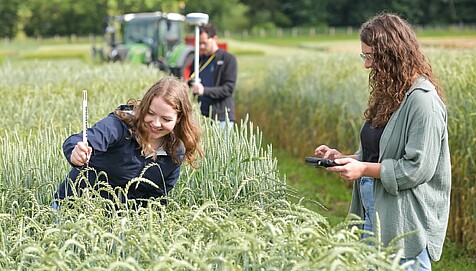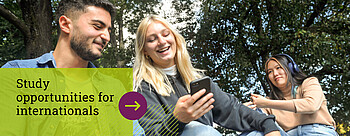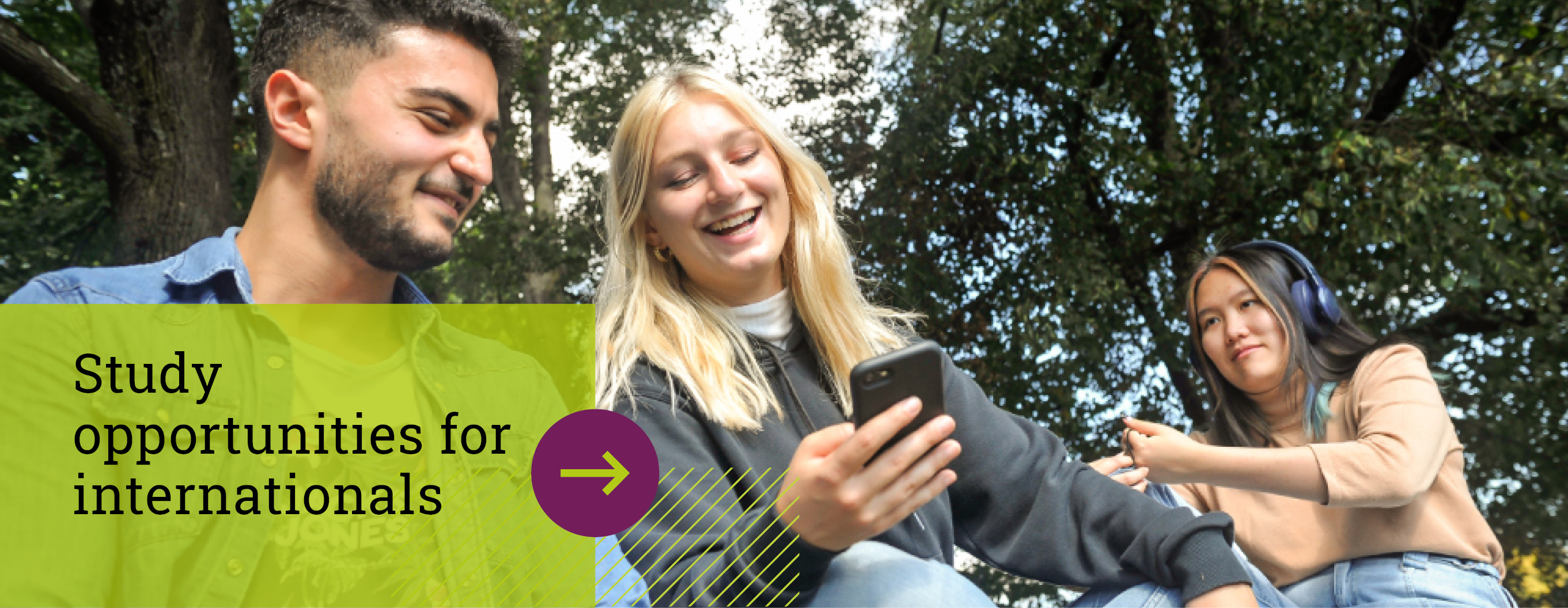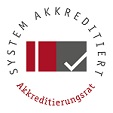Agricultural Sciences - without choosing a major
Exploring the diversity of agriculture
Agricultural Sciences (Master’s)
Major: without choosing a major
Exploring the diversity of agriculture
Agriculture is undergoing profound transformation processes around the world: In addition to food production, landscape, environmental, and resource protection are the tasks of the future. If you would like to help shape the transformation processes of future agricultural production, remain broadly positioned and draw on the entire range of topics in agricultural sciences, such as natural resources, ecology, plants, soils, agricultural technology, and agricultural policy issues, then this is possible in the Agricultural Sciences degree program without having to choose a major. Take advantage of the breadth and variety of courses offered by the largest agricultural faculty in Germany. The focus is on research-oriented work with talented researchers in their ongoing, inspiring projects.
What you can expect:
- We will help you develop and explore the topics that are important to you.
- Deal with current topics and examine them from different professional perspectives
- Take advantage of the variety of courses offered in Hohenheim, with over 250 modules at the Master's level.
- Incorporate aspects relating to sustainability, social and economic relevance as well as the environmental and ethical consequences of agricultural sciences seamlessly into your studies
- Prepare for interesting and varied careers in the agricultural engineering sector, including with internships
- Reasons to choose Hohenheim
| Degree Master of Science | 4 semesters 120 Credits | Language of instruction Deutsch | German | University places unlimited | Location Stuttgart | |||||
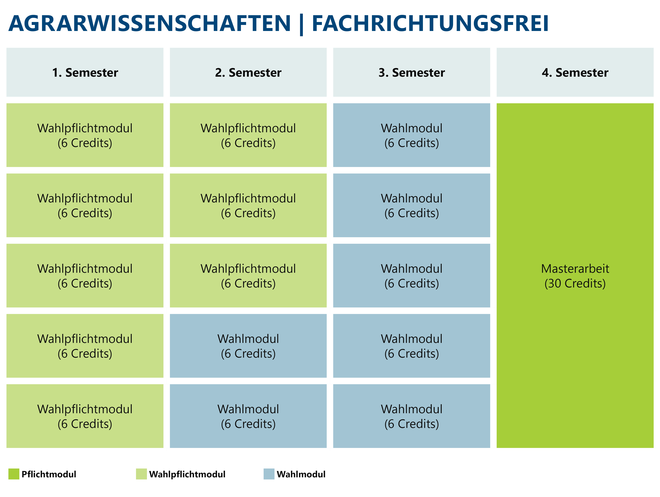
Diversity in depth and breadth
There are no compulsory modules in the degree program without a major. Here you can put together your own profile from the large pool of compulsory and elective modules in the three subject areas (soil sciences, agricultural engineering, plant production systems) and remain broadly based. You must complete at least 48 credits from this pool and can then choose a further 42 credits from the entire range of Master's modules, i.e. also from other Master's degree programs at the Faculty of Agriculture. If you have a special interest in topics that are not primarily agricultural, you can even choose elective modules from the degree programs offered by our neighboring faculties. If you are interested in a summer school or a stay abroad, this can be easily arranged in the 3rd semester. If you are well prepared, you should have no problem getting your credits recognized.
You would like to know more?
You can download detailed information about the course and structure of the program here:
- Module catalog for Agricultural Sciences
- Examination Regulations
- Academic program advisors
- Faculty of Agricultural Sciences
What you should bring with you
The Master's degree program in Agricultural Sciences builds on the knowledge you have acquired in general natural sciences and environmental, agricultural, or geosciences in your Bachelor's degree program in agricultural sciences, agricultural biology, biology, geology, or environmental science. If you have completed one of these Bachelor's degree programs or a related degree program and would like to study a broad range of subjects, then a Master's in Agricultural Sciences without a major is just right for you.
The formal requirements for the Master's program are:
- Bachelor’s degree in agricultural sciences or related subjects from a university in Germany or abroad, or from a university of applied sciences, with a standard period of study of at least 3 years (180 ECTS in total) (for further “related subjects”, see Annex 2 of the Admission Regulations).
- If your final grade or grade point average for that degree is not above average, you can submit separate evidence of your particular aptitude for the program (for details see Admission Regulations § 4).
You should have the following interests and knowledge in addition to the formal criteria:
- Interest in agricultural and technical topics and want to help shape their future
- Practical experience in agriculture/forestry, horticulture, and the environment is an advantage
- Openness to current issues such as climate action, sustainability, and transformation
- Interest in digital agriculture and AI
Preparing scientific results for use by practitioners
The best way to put your knowledge into practice is through an internship, which you can choose according to your interests and integrate into your studies.
Gaining practical experience
You can integrate an internship in an agricultural company or a company in an upstream or downstream sector into the degree program as part of the elective portfolio module.
Acquiring new skills
You will find additional further education opportunities on campus in the form of the F.I.T continuing education courses, the “Artificial Intelligence and Data Science in Hohenheim” (AIDAHO) certificate, or the start-up support in the “Innovation Greenhouse”.
Learning from practice
The degree program offers you numerous opportunities for practical learning. Lectures by practitioners, projects with companies, exciting excursions, and application-oriented projects during your studies give you a direct insight into professional practice and promote your ability to actively apply the knowledge you have acquired.
Strengthening language and intercultural skills
Would you like to improve your language skills? For this purpose, the Language Center at the University of Hohenheim offers various semester and intensive courses that you can take individually during your studies. You can even acquire the UniCert III C1 certificate as part of an elective module. During your studies, you will also acquire intercultural skills naturally by interacting with your fellow students from all over the world.
Researching during your studies
During your studies, you will be able to participate in scientific working groups and gain valuable insights into research practice. By actively participating in research projects, student research projects, and specialized research modules, you become part of the scientific process and acquire qualifications for independent scientific work.
Are you interested in an exchange semester? Make sure to start planning early. A stay abroad is best planned for your 3rd semester. It may also be possible for you to go abroad as part of your Master's thesis.
We cooperate in research and teaching with 80 partner institutions worldwide, 40 of which are part of the ERASMUS program.
The University of Hohenheim’s Office of International Affairs provides information and advice on stays abroad and how to finance them through scholarships.
What makes our degree program so special?
- Over 700 hectares of experimental fields give you plenty of practical space for your own experiments and research work.
- You have a considerable degree of freedom in the composition of your Master's program.
- You can choose from a wide range of modules at the Hohenheim Faculty of Agriculture thanks to over 50 professorships. This allows you to get a taste of other topics (e.g. business administration, organic farming, nutrition, environment, consulting, AI, etc.) in addition to your individual specialization.
- We very much encourage research in national and international projects. We can therefore help you, for example, to join a large collaborative research project or collect data in projects abroad as part of your Master's thesis.
- More good reasons for studying in Hohenheim
Kathrin Scharsich
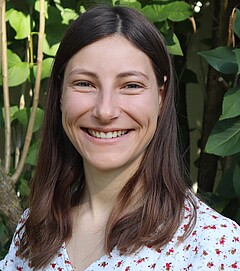
Where I work:
Staatliche Lehr- und Versuchsanstalt für den Gartenbau Heidelberg
I work there as:
Project Coordinator in the project "Urban biodiversity - safeguarding and promoting species diversity and biodiversity in urban areas"
I benefited from the following during my studies:
"What I particularly liked about studying agricultural sciences was the variety and the opportunity to choose modules that suited me. On the one hand, I was able to acquire broad knowledge in a wide range of areas and at the same time focus on topics that particularly interest me. In the "Bees" module, I discovered my enthusiasm for biodiversity and species conservation, which led me to my current job. Despite the corona-related restrictions during my Master's degree, I was able to learn a lot from the modules, as the lecturers tried very hard to adapt the content to the new conditions and still managed to offer interesting and informative modules. Independent work and self-organization in particular were always encouraged, and I was able to improve my presentation skills through many presentations and the subsequent feedback from the instructors. All of this prepared me very well for my day-to-day work and I am grateful for the experience I was able to gain in Hohenheim."
Theresa Schuller
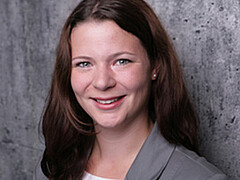
I am now at:
365FarmNet Group KGaA mbH & Co KG
I work there as:
Regional Sales Manager
I benefited from the following during my studies:
"The lectures were often supplemented by project work, practical exercises, and excursions. This variety was helpful for my academic work, but it also gave the opportunity to gain experience on my own that I can draw on in my everyday professional life. Due to the large selection of modules, I was able to individually design the content of my Master's program and set personal specializations. This also allowed me to meet many students from other departments, which is important for future networking."
Interesting and individual career prospects
In the Master's degree in Agricultural Sciences without a major you will create your own prospects for careers in agriculture and in the upstream and downstream sectors, or you will lay the foundations for an academic career.
You will have excellent opportunities in both the national and international job markets after completing your studies. Possible fields of activity include:
The following professions are open to you:
- Managing agricultural operations
- Planning and development
- Research and teaching
- Expert appraisals
- Teaching and advising
- Press and public relations
- Quality assurance
- Marketing and sales
- Development aid
- Management or project management
Potential employers include:
- Universities and other research and teaching facilities
- Government agencies in the agricultural and environmental sectors
- Companies in the agricultural, horticultural, environmental, energy technology, and water management sectors
- Companies in the supply, processing, and retail sectors
- Service companies
- Associations or cooperatives in the agricultural, environmental, and ecological sectors
- Organizations active in development cooperation
Topics related to agricultural sciences
- Degree program downloads
- Faculty of Agricultural Sciences
- Student Council for Agricultural Sciences
- Student Council for Agricultural Sciences’ Instagram channel: Important announcements from the Student Council for Agricultural Sciences and information about the Student Council’s activities.
- Master’s in Agricultural Sciences: Mailing list for enrolled students for communicating relevant information
| Admission type | Start of studies |
|---|---|
Without admission restrictions | Winter and summer semesters |
| Application deadlines | |
| Winter semester: 15 September (all). Applications should be preferably made by 15 July so that all enrollment formalities can be completed in time for the start of the program. Summer semester: 15 March (all). Applications should be preferably made by 15 January so that all enrollment formalities can be completed in time for the start of the program. | |
| Requirements | |
|---|---|
| Admission requirements | 1. Bachelor’s degree in agricultural sciences, biology, or related subjects from a university in Germany or abroad, or from a university of applied sciences, with a standard period of study of at least 3 years (180 ECTS in total) (for further “related subjects”, see Annex 2 of the Admission Regulations). |
| Selection procedure | |
|---|---|
| Selection criteria | None, as the number of places is not restricted
|
| It is possible to apply to a higher subject-related semester for the winter semester (application deadline: 15 September) and summer semester (application deadline: 15 March). | |
| Application process | |

